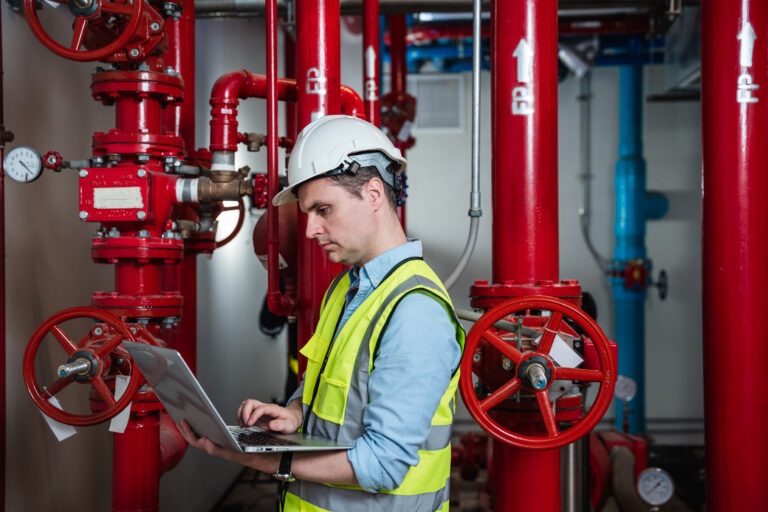Energy-Efficient Industrial Piping: Innovations for a Sustainable Future
Table of Contents
Energy-efficient industrial piping is essential for maintaining smooth operations, reducing costs, and supporting sustainability in modern industrial facilities. Without the right piping systems, industries can face leaks, inefficiencies, and costly disruptions. Fortunately, advancements in energy-efficient industrial piping have introduced solutions that help optimize operations and lower environmental impact.
In this guide, we’ll cover:
- The role of innovation in energy-efficient industrial piping
- Advanced technologies enhancing piping systems
- The benefits of smart piping systems
- High-density polyethylene pipes (HDPE)
- Chemical-resistant materials for piping systems
- Real-time monitoring and maintenance

The Role of Innovation in Energy-Efficient Industrial Piping
Innovation in energy-efficient industrial piping is crucial for improving safety and operational efficiency. Moreover, modern piping solutions offer enhanced durability while minimizing energy consumption. Traditional systems have served industries well in the past, but today’s demands require more eco-friendly solutions to meet energy-saving goals. These advances allow industries to operate more efficiently while reducing their environmental impact.
Advanced Technologies in Energy-Efficient Piping Systems
New technologies have greatly improved energy-efficient piping systems by increasing performance, extending the life of the systems, and reducing operational costs. As a result, businesses can benefit from better flow rates, fewer breakdowns, and optimized energy use.
Key Technologies:
- Fusion Welding: This process enhances the quality of pipe joints, leading to fewer leaks and better system performance, especially in high-pressure applications.
- Advanced Coatings: New coatings provide better protection against corrosion, which ensures the pipes last longer even in harsh environments. Learn more about corrosion protection for industrial piping systems.
- Composite Materials: These materials combine the strengths of different substances, making pipes more durable and energy-efficient.

Smart Piping Systems for Energy-Efficient Industrial Piping
Smart piping systems are changing the way industrial operations are managed. By using sensors and smart technology, these systems continuously monitor and optimize the piping network. This helps businesses improve energy efficiency while minimizing risks.
Benefits of Smart Piping Systems:
- Real-Time Monitoring: Sensors monitor temperature, pressure, and flow rates in real-time, helping identify issues early on.
- Predictive Maintenance: With data-driven insights, businesses can schedule maintenance before any major problems arise, reducing downtime.
- Increased Efficiency: By monitoring energy usage, smart piping systems help industries cut down on wasted energy and improve overall performance. Discover more about smart industrial piping solutions.
Alt text: “Smart piping systems featuring real-time monitoring for optimized energy efficiency in industrial operations.”
High-Density Polyethylene (HDPE) Pipes for Energy-Efficient Industrial Piping
High-Density Polyethylene (HDPE) pipes are becoming more popular in energy-efficient industrial piping due to their durability, flexibility, and resistance to chemicals. They provide an affordable and reliable option for many industries.
Advantages of HDPE Pipes:
- Chemical Resistance: HDPE pipes are ideal for industries such as chemical processing because they can withstand a wide range of chemicals.
- Durability: These pipes are highly resistant to damage, offering a long service life that helps reduce the need for frequent repairs.
- Flexibility: HDPE pipes can be bent to fit into various configurations, which helps reduce energy loss and the need for additional fittings.
Alt text: “High-density polyethylene (HDPE) pipes used in energy-efficient industrial piping for chemical processing.”
Chemical-Resistant Materials for Energy-Efficient Piping Systems
The use of chemical-resistant materials is key to ensuring the durability and safety of energy-efficient industrial piping systems. These materials help prevent corrosion and other damage, making the systems last longer and reducing the need for maintenance.
Common Chemical-Resistant Materials:
- Stainless Steel: Stainless steel is known for its excellent resistance to corrosion and high temperatures, making it perfect for industrial piping.
- PVC and CPVC: These lightweight plastics are resistant to many chemicals, making them ideal for lower-pressure environments.
- Glass-Lined Steel: This material combines the strength of steel with the non-corrosive properties of glass, making it suitable for handling harsh chemicals.
Choosing the right chemical-resistant materials is important for ensuring that your piping system is efficient and long-lasting. Learn more about choosing the right piping materials for your operations.
Energy-Efficient Piping Solutions with Real-Time Monitoring
Real-time monitoring is an important part of energy-efficient industrial piping systems. It allows businesses to continuously track the condition of their pipes and identify potential issues before they become serious.
Key Benefits of Real-Time Monitoring:
- Early Detection of Issues: Monitoring systems can detect problems early, allowing businesses to make repairs before the issues escalate.
- Reduced Downtime: With predictive maintenance, industries can reduce the risk of unplanned downtime and keep operations running smoothly.
- Enhanced Safety and Efficiency: Real-time monitoring ensures that the piping system is working within safe limits, improving both performance and safety. Learn more about real-time monitoring solutions for your facility.
Conclusion
Know more about us
- The Role of Industrial Piping Engineering in Large-Scale Projects
This blog explores the critical role of piping engineering in large-scale projects, complementing the discussion on innovative solutions in industrial piping. - Sustainability in Industrial Piping and Fabrication Best Practices
This blog highlights sustainable practices in piping, aligning with innovative approaches to improve efficiency and environmental impact.
Understand more about with this useful resources
- American Society of Mechanical Engineers (ASME) – Advancements in Piping Technology
ASME provides insights into the latest advancements in piping technology, offering valuable context for innovative solutions in industrial piping. - Piping Designer – Piping Technologies
This resource offers technical information on modern piping technologies, supporting the exploration of innovative piping solutions.
Related Blog to read
An Overview of Industrial Piping Systems and Their Applications
This blog provides a comprehensive overview of industrial piping systems, serving as a foundational resource to understand the applications of innovative solutions.
Want Greener, More Efficient Piping Solutions?
SRJ Piping India helps you integrate energy-efficient piping innovations that boost performance and reduce environmental impact.
